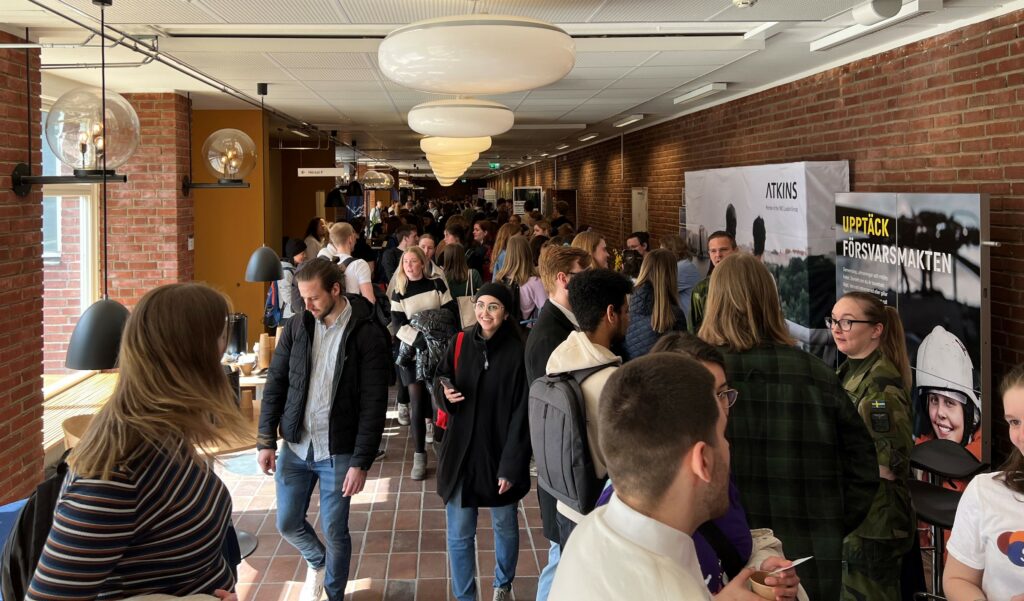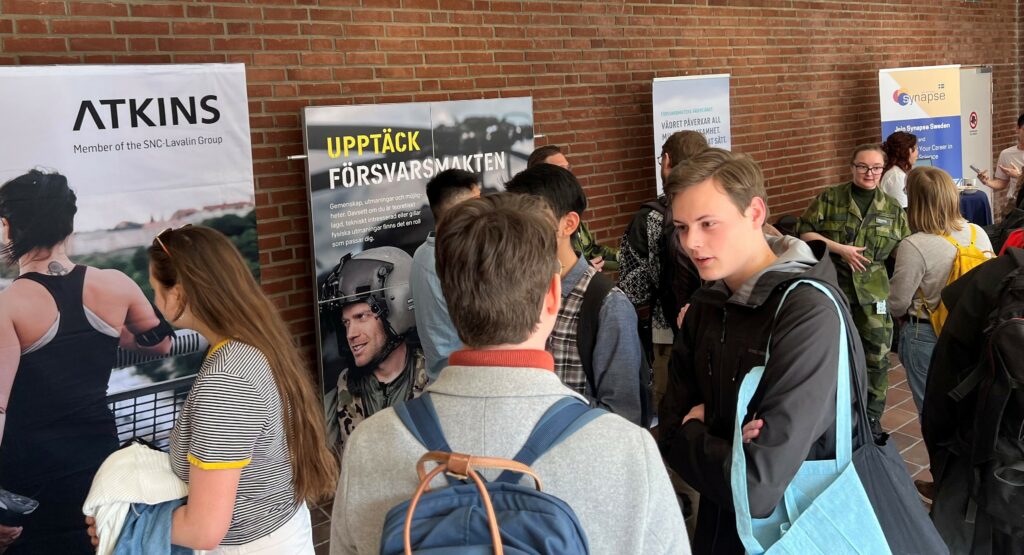At Lunds naturvetarkår (LUNA), the Head of Corporate Relations and the Corporate Relations Committee serve as a bridge between students and their future employers. With over 2,000 students across various scientific fields, the Faculty of Science offers a unique opportunity to connect with the talent of your choice in a way that suits your needs.
Through us, you gain direct access to inform, network, and recruit skilled students at the forefront of science. Engaging with students through our initiatives helps strengthen your company’s presence and increases the likelihood that they will turn to you for future opportunities. We offer various activities tailored to your preferences, ensuring meaningful interactions with potential future employees.
Participation in the event costs 2000 SEK and includes tables and chairs, breakfast, as well as fika, coffee, and tea throughout the day. Nonprofit organisations are not required to pay fees to participate in the career fair. We can arrange lunch for you for an additional cost. You are also welcome to bring your own lunch.
If you have any questions or are interested in participating in ATLAS, please contact our Head of Corporate Relations, Chelsea Ann Connell.


Our Students
The Faculty of Science offers education across a wide range of scientific disciplines. Science students have the flexibility to tailor their studies to align with their interests and your company’s needs. Below, you’ll find examples of typical student experiences, but these only scratch the surface of their capabilities.
Biology students are experts in understanding the mechanisms of life, from single cells to entire ecosystems. With 12 specialised Master’s programs, they develop deep expertise in their chosen fields, equipping them with the knowledge to navigate complex biological systems.
Their education covers cellular and physiological processes, species evolution, behavior, and ecological interactions. They also gain insights into nature and environmental protection, including the transport and degradation of pollutants, the connections between climate and ecosystems, and strategies for preserving biodiversity.
Biology students may have extensive laboratory experience or hands-on expertise in fieldwork and excursions. Regardless of focus, all biologists are trained to collect, analyse, and interpret biological data using statistical methods, preparing them for a wide range of scientific and applied careers.
Specialisations
- Animal Ecology
- Aquatic Ecology
- Biochemistry
- Conservation Biology
- Evolutionary Biology
- Microbiology
- And more!
Molecular Biology students acquire in-depth theoretical and practical expertise in a fast-evolving field central to research and industry. Their education bridges biology, chemistry, and medicine, guided by top researchers at the forefront of scientific advancements.
Their knowledge is valuable in sectors such as medicine, biotechnology, and the food industry, contributing to innovations in drug development, energy production, and more. Additionally, studies in Molecular Biology can be combined with Chemistry, further expanding their interdisciplinary skill set.
Specialisations
- Bioinformatics
- Biomedicine
- Genetics and Biotechnology
- Immunology and Infection Biology
- Medical Biology
- Molecular Biology
- And more!
Physics is the most diverse field within the Faculty of Science, equipping students with a broad skill set highly valued in today’s job market. Graduates develop expertise in handling big data, programming, statistical analysis, and complex problem-solving.
Depending on their specialisation, students gain in-depth knowledge in astronomy, particle physics, materials science, and quantum mechanics. The analytical and problem-solving abilities of physicists make them indispensable across various industries, including medicine, electronics, communication technology, and manufacturing.
Additionally, studies in Physics can be combined with Chemistry, further expanding their interdisciplinary expertise.
Specialisations
- Astronomy and Astrophysics
- Computational Science
- Experimental Particle and Nuclear Physics
- Materials Science
- Meteorology
- Nanoscience
- Photonics
- Synchrotron Radiation-Based Science
- Theoretical Physics
- Quantum Science and Technology
- X-ray and Neutron Science
- And more!
Students in Medical Radiation Physics receive a comprehensive education, gaining deep theoretical and practical knowledge in mathematics, physics, and specialised fields such as biological physics and imaging diagnostics. They become experts in medical applications, with a strong clinical focus on both diagnostic and therapeutic techniques, while also being well-versed in radiation safety measures.
Graduates earn a professional degree (yrkesexamen) and a license to work as medical physicists, equipping them for healthcare, research, and radiation protection careers.
Employers praise chemistry students at the Faculty of Science for their strong laboratory skills. From the very start of their education, chemistry students at the Faculty of Science gain hands-on experience. They are trained in modern lab techniques, including spectroscopy, chromatography, and electrophoresis, ensuring they are well-prepared for research and industry applications.
The Bachelor’s program provides a broad foundation in all major chemistry disciplines, including analytical, organic, inorganic, physical, and biochemistry. This deep understanding of chemical interactions at the cutting edge of science enables chemistry students to tackle complex challenges in both academic and industrial settings.
With four specialised Master’s programs, students can further refine their expertise in protein chemistry, advanced organic synthesis, physical and theoretical chemistry, and numerical simulations. Additionally, studies in Chemistry can be combined with Molecular Biology and/or Physics, offering further interdisciplinary opportunities.
Specialisations
- Biochemistry
- Computational Science
- Nanochemistry
- Physical Chemistry
- Synthetic and Analytical Chemistry
- And more!
Our mathematics students develop analytical and practical skills, enabling them to grasp complex and abstract concepts while tackling challenging problems innovatively. Their strong theoretical foundation applies to a wide range of fields, including finance, logistics, and data analysis.
Beyond their expertise in logical reasoning, mathematicians are well-trained in practical applications such as programming, statistics, and data science. With a Master’s degree in either mathematics or numerical analysis, graduates are equipped to design and refine complex algorithms, work with diverse datasets, and identify, analyse, and solve intricate problems across various industries.
Specialisations
- Numerical Analysis
- Statistics
- And more!
With the world facing numerous environmental challenges, our environmental science students possess the expertise needed to understand and address these complex issues. They develop a comprehensive understanding of the connections between physics, chemistry, biology, and geology, giving them a broad perspective on environmental processes. This interdisciplinary foundation also equips them to collaborate effectively with experts from various fields—an essential skill in their profession.
Our environmental science students are trained to develop scientifically grounded solutions for long-term sustainable development while identifying and mitigating existing environmental problems. While their primary focus is scientific, they also gain knowledge in law, political science, and economics, enabling them to understand the root causes of environmental issues and how they are regulated, managed, and prevented.
With four specialised Master’s programmes, environmental scientists are well-prepared for careers across a wide range of fields, from research and policy-making to industry and environmental consultancy.
Specialisations
- Computational Science
- Environmental Management and Policy
- Environmental Studies and Sustainability Science
- And more!
Our geology students explore Earth’s past, present, and future, delving into the evolution of life, ecosystems, ice ages, climate variations, volcanism, and the formation and destruction of tectonic plates, oceans, and mountain ranges.
They are trained to work with advanced research equipment, including state-of-the-art microscopes for analysing rocks and microfossils. Geology students develop expertise in understanding bedrock and soil composition, as well as how water and pollutants move through these layers. Fieldwork is a central part of their education, with numerous excursions and hands-on exercises that prepare them for real-world applications.
Through practical investigations, geology students map natural resources such as groundwater, ores, and minerals, conduct environmental and ground assessments, and interpret landscapes to solve challenges in water supply, pollution, natural disasters, geological mapping, mining, and climate science. Their extensive practical expertise makes them well-equipped for construction, environmental management, and nature conservation careers.
Specialisations
- Bedrock Geology
- Quaternary Geology
- Computational Science
- And more!
Students in the Physical Geography and Ecosystem Science program follow a unique blend of courses, leading to a highly specialised degree with in-depth knowledge of major natural systems. They develop a comprehensive understanding of how climate, soil, and ecosystems interact within both society and nature.
The program focuses on environmental modelling and management, equipping students with advanced digital skills and extensive fieldwork experience. Their studies provide a strong scientific foundation in climate processes, hydrology, landscape dynamics, and vegetation interactions.
With five specialised Master’s programs, students can further refine their expertise in geographical information systems (GIS) and remote sensing, as well as the environmental and societal development of ecosystems and sustainability challenges.
Specialisations
- Atmospheric Science
- Biogeochemical Cycles
- Computational Science
- Geographical Information Systems (GIS)
- Geomatics
- Geophysics
- Remote Sensing
- And more!
Students in the Applied Computational Science program develop strong interdisciplinary skills at the intersection of mathematics, programming, and natural sciences. They gain expertise in solving complex scientific and industrial problems using computational models, data analysis, and simulations. With a foundation in numerical methods, machine learning, and scientific computing, students learn to process and interpret large datasets across various scientific fields, from climate science and physics to biology and engineering. The program emphasises hands-on experience with coding, algorithm development, and high-performance computing, preparing graduates for careers in data science, software development, research, and technological innovation.
Specialisations
- Biology
- Chemistry
- Environmental Science
- Geology
- Physical Geography

